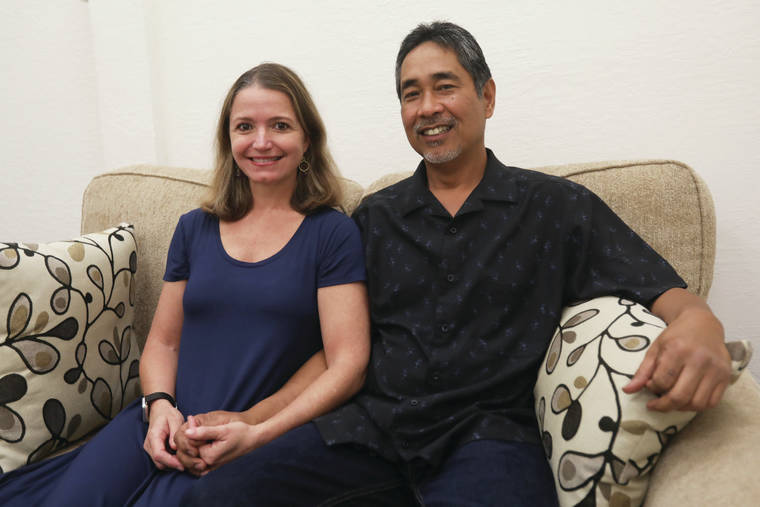Catholic Charities Hawaii is seeking therapeutic foster parents on Hawaii Island to provide specialized foster care for emotionally and behaviorally challenged youths ages 5-19.
Their Na ‘Ohana Pulama program — which translates to “Families of Light and Nourishment” — will provide training and support for qualified adults willing to open their homes and their hearts to youngsters in need.
According to Jonathan Mendoza, a therapeutic foster parent trainer for the program, there’s an urgent need for about a dozen or so more therapeutic foster homes.
“Before the pandemic, we had about 15 to 20 licensed families. We can take as many as we can train,” Mendoza said Tuesday.
“It’d be nice to have a pool of about 30 parents, because many of them do respites — they don’t do full-time placements,” he said. “But they help out families who do full-time placements. So, we can use some parents to just help out on weekends or for a weeklong stretch, or when difficulty arises, just to give the full-time families a break.”
Mendoza and his wife, Danielle, who is a parent consultant for the program, have been with CCH for 25 years. They also are also licensed therapeutic foster parents.
Danielle Mendoza said the difficulty finding qualified individuals has increased since the pandemic began.
“We’re at the lowest level we’ve been in 20-some years,” she said. “There’s a level of difficulty in general, especially for this level of care, because it’s therapeutic foster care versus the (Department of Human Services) level of foster care. They come to us specifically for behavioral issues and dealing with their trauma, and we try to help them move forward as a family.”
Youths referred for placement often have been diagnosed with attention deficit hyperactivity disorder, disorders on the autism scale or were born to mothers who were abusing drugs during pregnancy. Some also are in the juvenile justice system.
According to a brochure, the program follows the nationally accredited Teaching-Family Model, in which the families and professional staff “collectively help children and families learn to change their behaviors and deepen their relationships.”
“We give lots of training, lots of support,” Danielle Mendoza said.
Compensation for families in the program starts at $50 for each night the youth sleeps at the foster home and can increase to $75 per night. Mileage compensation and occasional bonuses also are part of the program.
“Sometimes, we have some Catholic Charities funds to help them out with Christmastime, clothing, school supplies,” Danielle Mendoza said.
“So, the parents don’t have to pay all the expenses. There’s different resources we can tap into,” her husband added.
Therapeutic foster parent applicants will be interviewed and are subject to a background and criminal record check and home inspection.
“There’s a lot of red tape, so to speak, to get through it, but that’s because we want to make sure the kids are in a place that’s safe,” Jonathan Mendoza said.
“Also making sure they can maintain the child at home without the foster income. So not solely relying on the income from fostering to help the youth,” Danielle Mendoza added.
Those who are accepted into the program will receive an initial 40 hours of training — at least some of it on Zoom because of the pandemic — and a parent consultant. Additional training is always available.
“We help them learn how to deal with behaviors due to the trauma the kids have experienced,” Danielle Mendoza explained. “One of the biggest resources our parents have that DHS foster parents — who are a lower level of care — don’t have is the ongoing training. They do a lot of training. And during their time with us, they have a specific parent consultant who just kind of holds their hand during their placement.”
Added Jonathan Mendoza, “What’s cool about our program is that we have training where families can bring up an issue we can look into. We have a clinical psychologist on Oahu that helps to train our families.”
Applicants can be adult married couples of any age, unmarried couples, single adults and same-sex couples.
“Some of the kids in our care are struggling with their own identity and need those types of folks to be supportive,” Danielle Mendoza said.
Some currently licensed foster families have been reluctant or resistant to take youths into their homes without assurances they’ve not been exposed to or infected with COVID-19. CCH is currently working with the state Department of Health to allow COVID-19 testing or screening of foster children.
The Mendozas said while therapeutic foster care is designed to be temporary, sometimes more permanent bonds develop between the foster parent and the child.
“This is not an adoption agency. This is a foster care agency,” Jonathan Mendoza said. “They’re not there to be a forever home. The goal is to get them back to their birth parents or independent living. But some of the parents attach easily. They go, ‘I just love this kid. I don’t want him to go anywhere. I just want to keep him.’ Some of them develop lifetime relationships with them. Some of them have helped dozens of kids over the years.
“But once in a while, there’s guardianships that happen with some of the families.”
“And even adoptions,” added Danielle Mendoza. “But that’s not the goal when we first place them.”
Interested individuals can call CCH’s Hilo office at 961-7016 or visit catholiccharitieshawaii.org.
Email John Burnett at jburnett@hawaiitribune-herald.com.






